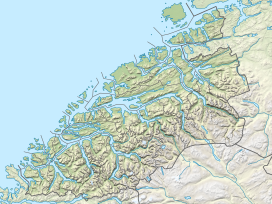This article needs additional citations for verification. (April 2022) |
| Troll Wall | |
|---|---|
| Trollveggen (Norwegian) | |
 The Troll Wall. Store Trolltind is the highest point along the ridge. | |
| Highest point | |
| Elevation | 1,700 m (5,600 ft) |
| Coordinates | 62°28′57″N 7°43′44″E / 62.4824°N 7.7288°E[1] |
| Geography | |
| Location | Møre og Romsdal, Norway |
| Parent range | Romsdalsalpane |
| Topo map | 1319 I Romsdalen |
The Troll Wall (English) or Trollveggen (Norwegian) is part of the mountain massif Trolltindene (Troll Peaks) in the Romsdalen valley in Rauma Municipality in Møre og Romsdal county, Norway. It is located to the south of the towns of Åndalsnes and Molde inside the Reinheimen National Park. The Troll Wall is the tallest vertical rock face in Europe, about 1,100 metres (3,600 ft) from its base to the summit of its highest point. At its steepest, the summit ridge overhangs the base of the wall by nearly 50 metres (160 ft). The Rauma River, the Rauma railway and the European Route E136 run just to the east of the wall.[2]
The rock is gneiss, formed into a broken rock wall of huge corners, concave roofs, and crack systems, topped with a series of spires and pinnacles on the summit rim. The rock is generally loose, and rockfall is the norm on this north-facing big wall. There was a series of large rockfalls on the wall in September 1998, radically changing the character of several climbing routes.[3]
The wall has been a destination for climbers and BASE jumpers alike. Carl Boenish, the "father" of BASE jumping, was killed on the Troll Wall in 1984 shortly after setting the world record for the highest BASE jump in history. His wife, Jean Boenish, jumped with him and held the record until Valery Rozov jumped off Mount Cho Oyu in 2017, jumping from 7,700 metres (25,250 ft).[4] BASE jumping from the Troll Wall has been illegal since 1986.
- ^ "Trollveggen, Rauma (Møre og Romsdal)" (in Norwegian). yr.no. Retrieved 2019-07-06.
- ^ Store norske leksikon. "Trollveggen" (in Norwegian). Retrieved 2010-10-27.
- ^ "TROLLVEGGEN", alpinist.com, 1 September 2003. Retrieved 18 January 2011.
- ^ "World Record BASE Jump Set From 25,250 Feet". www.redbull.com.

